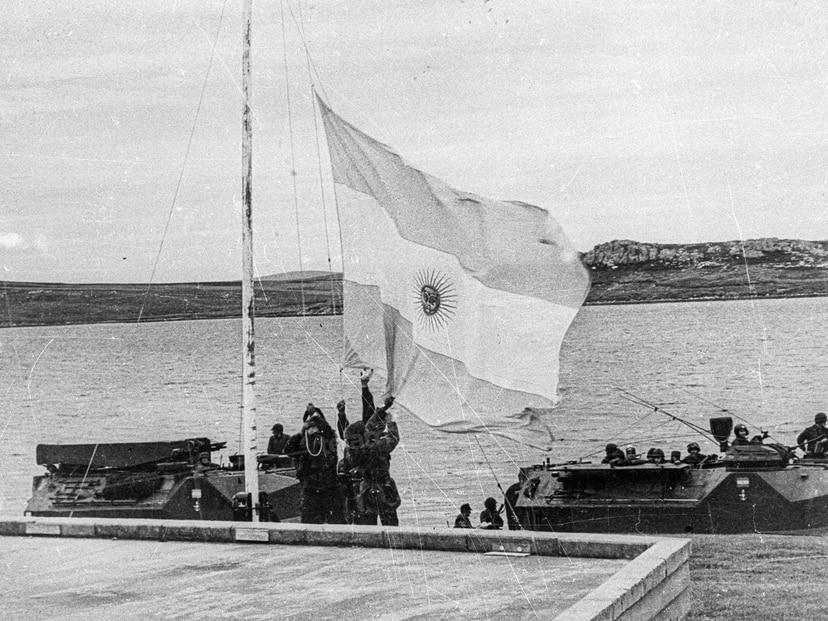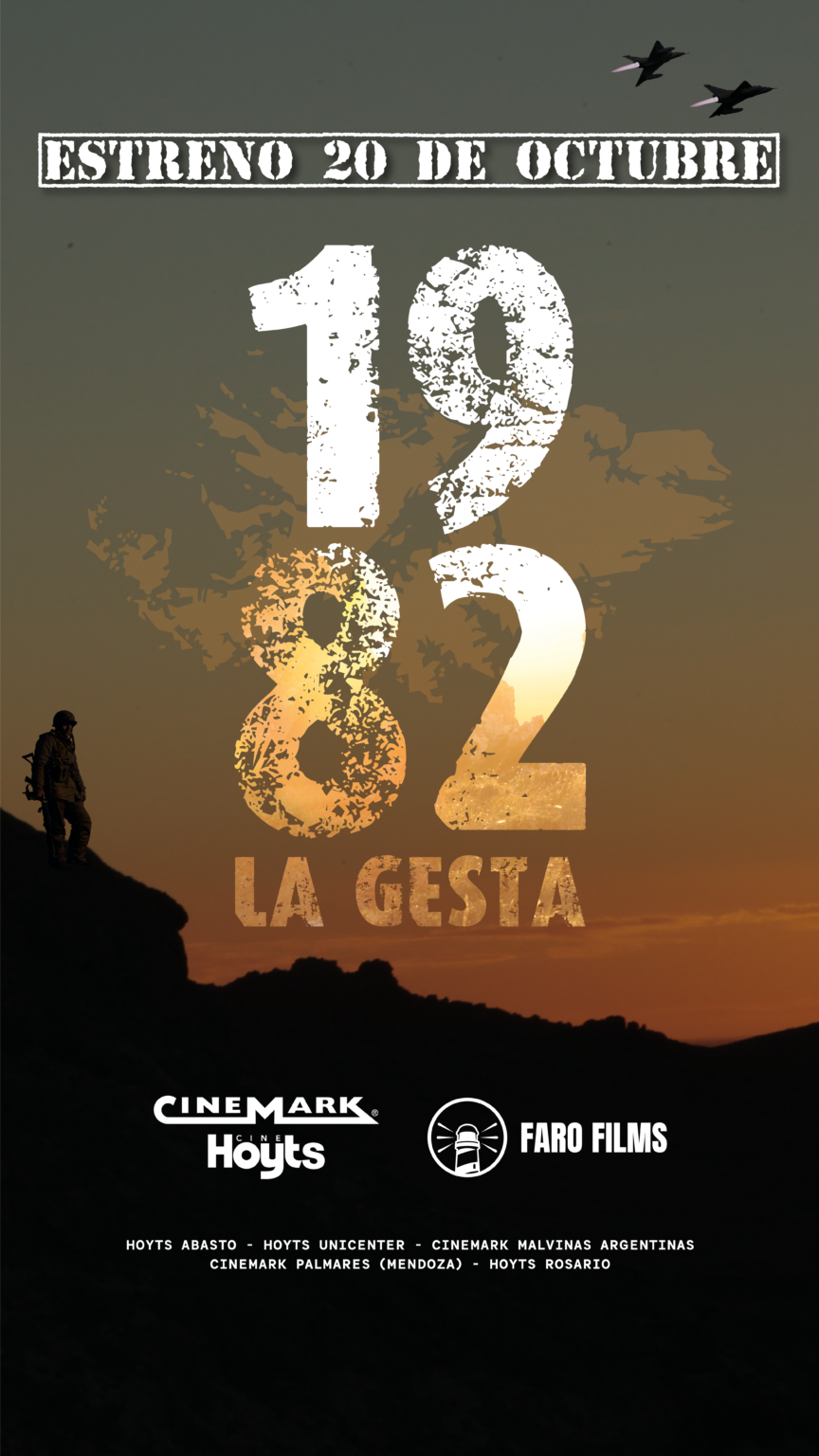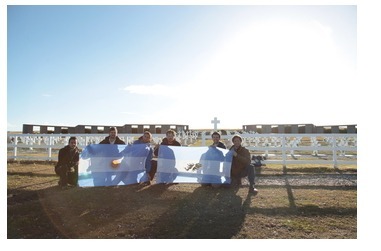1982 La Gesta: a new film recounts a forgotten war in the South Atlantic
A story never told before.

Argentine soldiers raise flag at Falklands/Malvinas islands, 1982. Telam photo.
While the world is fixated with the war in Ukraine, an independent filmmaker is taking a look at the conflict in the South Atlantic of 40 years ago that arrested the world’s attention and still divides world opinion.
“If you mess with the Malvinas, you won’t come back,” said a war veteran to Argentine film director in advance of a visit by movie director Nicolás Canale to the archipelago known to English-speakers as the Falkland Islands.
Canale, 37, has just released “1982: La Gesta” as a documentary film about the 10-week long war between Argentina and the United Kingdom over the windswept islands in the South Atlantic that had long been claimed by the South American republic.
Argentine troops took possession of the islands in April 1982, sweeping away the skeleton crew of British military there. Within weeks, the British navy, air force and army mounted their biggest operation since World War 2. In short order, the British defeated the Argentine forces. The upshot was the weakening of Argentina’s military government and the ushering in of democratic change, while the tenure of British prime minister Margaret Thatcher was confirmed.
{"preview_thumbnail":"/sites/default/files/styles/video_embed_wysiwyg_preview/public/video_thumbnails/GRiuna0_Rkw.jpg?itok=3pMnBJL9","video_url":"https://www.youtube.com/watch?v=GRiuna0_Rkw","settings":{"responsive":1,"width":"854","height":"480","autoplay":0},"settings_summary":["Embedded Video (Responsive)."]}
Or see the trailer here.
The war is largely forgotten by Americans and Britons, but remains a perennial point of contention in Argentina. Even the name of the islands is controversial. Known as Malvinas by the entire Spanish-speaking world, both the United States and United Kingdom refer to the British dependent territory as the Falkland Islands. The two nations were joined in defeating Argentina at the time.
As part of preparations for filming, Canale and his Faro Films production crew visited the islands in January 2019 to observe the battlefields where Britons and Argentines once fought. Canale and crew found not only vestiges of combat between the two sides, but even the remains of clothing and gear left by Argentine troops.
In an interview, Canale said they visited the Argentine Cemetery at Darwin, a small settlement that lies near the Goose Green battlefield. Remembering his sobering visit to the graves of 236 fellow Argentines there, Canale said, “I felt more committed to the cause of Argentine sovereignty.”

Argentines still recall the loss of 649 of their countrymen in a 10 week long undeclared war that saw the United States side with the United Kingdom -a NATO ally. Among the Argentine dead were 323 souls lost on the ARA Belgrano, a light cruiser sunk by torpedoes fired by a British submarine.
During the conflict, 255 British troops were lost. In addition, three civilians of the islands were killed by friendly fire. In the fighting, the now disgraced Prince Andrew, Duke of York, flew multiple missions as a Royal Navy helicopter pilot, rescuing troops and serving as a decoy for Exocet missiles launched by the Argentines.
Canale recalled that the Argentine government rejected a UK offer to ship Argentine dead to Buenos Aires, claiming that the troops were already in their homeland.
He said that apart from media coverage at the time, there has been little recognition since 1982 of the sacrifices made by ordinary Argentine combatants. He referred to Argentine veterans and the dead as “heroes to whom a debt is owed.” Before filming, Canale read history books and news accounts of the war and its outcome before visiting the islands in 2019.
The 80-minute film is being shown in cinemas in Buenos Aires. It features interviews with 22 veterans, representing the various branches of the Argentine armed forces that participated in the conflict. Canale said he was not able to include interviews with civilians involved with the war, nor veterans of Argentina’s coastguard and national police.
Canale was of the idea that, 40 years after the conflict, there was still a debt owed to veterans, who he calls heroes. "There is a lack of recognition, beyond the fact that for some time the facts of the war have been broadcast by the media."

Nicolas Canale and team at Argentine Cemetery, Darwin, Falkland Islands, 2019. (Submitted photo)
Interviews began in February, which were followed by months of editing and production.
Among the questions they asked were: What do the Malvinas mean to you? What is it like losing comrades? How were they enlisted by the military?
"They don't want to feel like heroes,” Canale emphasized, adding, “They all say that the real heroes are the dead: they get all the credit.” He said that the testimony from veterans of the Air Force, which gained grudging admiration on the part of the British military during the war, is especially illustrative.
Among the veterans interviewed were Jorge Guidobono, who served as Army lieutenant, and sub-lieutenant Lautaro Jimenez Corbalan. Jimenez Corbalán said of the British: “They underestimated the ability of the Argentines. They thought it would be just a shoot-out, that we would surrender, and everything would be over.”
Another veteran tells the camera, “While everyone else fights for self-interest, we fight out of love.”
Funding for the film came largely from donations, but a contribution by the municipal government of San Miguel, a Buenos Aires suburb, was also a boost for the nonprofit, independent Faro Films.
Among the principal collaborators in the film are: Matías Payer, Claudia Echeverría, Patricio Dondo, Santiago Bär, Santiago Molina Pico, Luis Ricoveri, Francisco Vásquez, and Juan Widow.